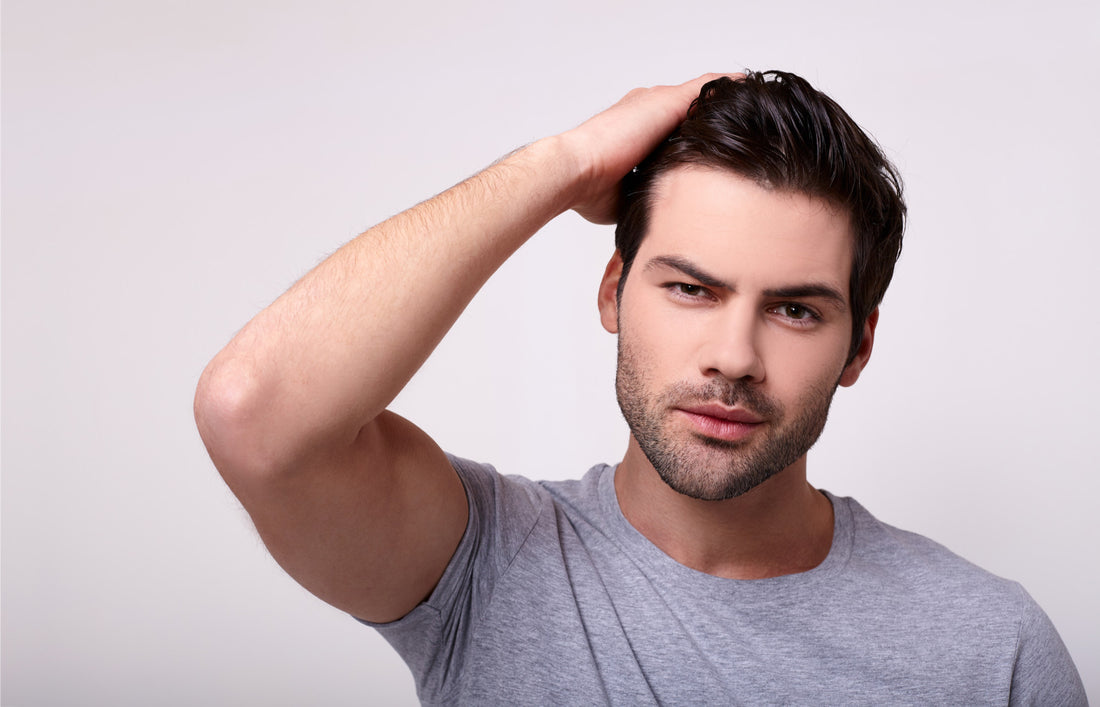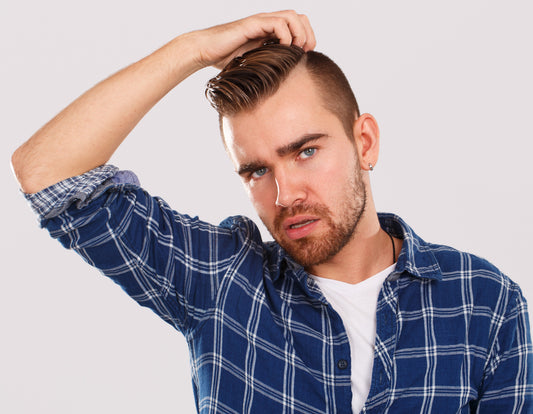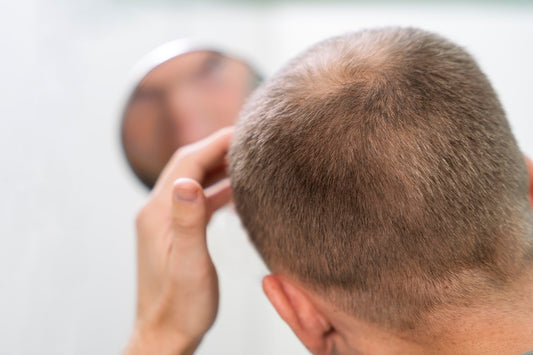Drawing from scientific research and expert advice, we explore the significance of lifestyle habits, nutrition, and supplements for maintaining and enhancing healthy hair. If you've been striving for stronger, shinier, and healthier hair, you're at the right place.
Let's unravel the essentials together to create a personalized, holistic strategy for your hair health. Stick with us and embark on a journey toward radiant and robust hair.
Lifestyle Habits for Healthy Hair
Aligning our lifestyles with the goal of optimal hair health can contribute significantly to the process. Let's take a look at some essential habits to adopt:
Stress Management
Chronic stress can negatively impact hair growth, causing hair thinning and hair loss. Implementing stress management techniques, such as:
- Meditation
- Deep breathing exercises
- Yoga
- Regular exercise
- Adequate sleep (7-9 hours per adult night)
Scalp Care
A healthy scalp is the foundation of healthy hair. Adopting a proper hair care routine will prevent scalp issues and promote hair growth.

Some steps to consider:
- Choose hair care products based on your scalp type, such as dry, oily, or normal scalp. Opt for gentle, sulfate-free shampoos and silicon-free conditioners.
- Do not wash your hair too frequently; every 2-3 days is sufficient for most individuals.
- Regularly exfoliate your scalp using gentle scalp exfoliators or natural ingredients, such as apple cider vinegar diluted with water.
- Avoid using hot tools excessively; extreme heat can cause hair damage and breakage.
Hydration
Staying hydrated is essential for overall health, including hair health. Drinking enough water helps flush out toxins and supports cell function, which is crucial for hair growth.
- Aim for at least eight glasses of water per day.
- Consume a diet abundant in hydrating fruits and vegetables like watermelon, cucumber, and celery.
Protect Hair from External Factors
Limiting exposure to harmful external factors, such as pollution or extreme weather conditions, can help maintain hair health.
- Wear a hat or a scarf during harsh weather.
- Avoid excessive sun exposure, as UV radiation can weaken hair.
- Regularly trim hair every six to eight weeks to manage split ends and promote healthy growth.
The Importance of Proper Nutrition for Healthy Hair
Proper nutrition is vital for maintaining healthy hair and promoting growth. A well-balanced diet consisting of essential nutrients helps nourish hair follicles, fortify hair strands, and prevent damage.
To support your hair health, consider adopting a varied and balanced diet, including the following:
Lean Protein Sources
Protein is the building block of hair, as hair is primarily made up of a protein called keratin. Including lean protein sources in your diet aids in hair growth and repair.

Suggested food sources:
- Chicken
- Turkey
- Fish (e.g., salmon, tuna, and sardines)
- Beans (e.g., black beans, kidney beans, and chickpeas)
- Lentils
- Tofu
- Tempeh
Healthy Fats
Healthy fats, particularly omega-3 fatty acids, play a crucial role in maintaining hair health. They contribute to natural moisture, increased elasticity, and overall vitality of hair.
Suggested food sources:
- Avocado
- Nuts (e.g., walnuts, almonds, and cashews)
- Seeds (e.g., chia seeds, flaxseeds, and pumpkin seeds)
- Fatty fish (e.g., salmon, mackerel, and sardines)
- Olive oil and cold-pressed coconut oil
Vegetables and Fruits
Vegetables and fruits are rich in essential vitamins, minerals, and antioxidants that support hair growth and strength. They help combat free radicals, reduce inflammation, and promote a healthy scalp.

Suggested food sources:
- Leafy greens (e.g., spinach, kale, and arugula)
- Cruciferous vegetables (e.g., broccoli, cauliflower, and Brussels sprouts)
- Root vegetables (e.g., carrots, sweet potatoes, and beets)
- Berries (e.g., blueberries, strawberries, and raspberries)
- Citrus fruits (e.g., oranges, lemons, and grapefruit)
Whole Grains
Whole grains are indispensable in providing additional vitamins and minerals pivotal for hair health. They offer B vitamins, zinc, and iron, supporting hair growth, maintaining hair color, and preventing breakage.

Suggested food sources:
- Whole wheat bread and pasta
- Brown rice
- Quinoa
- Oats (e.g., steel-cut oats and rolled oats)
- Barley
- Whole grain cereals
By incorporating these nutrient-dense foods into your diet, you will be providing your hair with a solid foundation for growth and strength. Prioritizing balanced nutrition is a fundamental step in achieving and maintaining healthy, vibrant hair.
Key Nutrients for Healthy Hair
Some key nutrients to consider when seeking optimal hair health include:
Biotin (Vitamin B7)
- Supports keratin production, the fundamental protein in hair structure.
- Sources: eggs (primarily egg yolk), legumes, nuts, and seeds.
Vitamin A
- Enhances sebum production (natural scalp oil), keeping hair moisturized.
- Sources: sweet potatoes, carrots, spinach, kale, and dairy products.
Vitamin C
- Improves collagen production, a key structural protein in hair.
- Acts as an antioxidant, fighting damage from free radicals that can impact hair growth.
- Sources: oranges, strawberries, broccoli, and bell peppers.
Vitamin D
- Stimulates new hair follicle creation.
- A deficiency in Vitamin D has been linked to hair loss and delayed hair growth.
- Sources: fortified dairy and alternative milk products, fatty fish, egg yolks, and sun exposure.
Vitamin E
- Supports a healthy scalp and prevents oxidative stress within hair follicles.
- Sources: almonds, sunflower seeds, spinach, and avocados.
Iron
- Facilitates adequate oxygen delivery to hair follicles by aiding the production of red blood cells.
- Iron deficiency can result in hair loss and slowing growth.
- Sources: spinach, beans, lentils, tofu, red meat, and pumpkin seeds.
Zinc
- Necessary for hair growth and repair.
- Regulates the oil glands surrounding hair follicles.
- Sources: oysters, nuts, seeds, lean meats, and whole grains
Supplements for Healthy Hair
Dietary changes are fundamental to promoting hair health. However, achieving optimal nutrient levels through diet alone can sometimes be challenging. In such cases, proper supplementation can provide extra support for hair growth and maintenance.
As always, it is crucial to consult a healthcare professional before adding any new supplements to your hair regimen.
Biotin for Keratin Production
Biotin, part of the Vitamin B family, is essential for the production of keratin, the primary protein found in hair. Biotin supplements could help strengthen hair strands, sustain healthy growth, and may reduce hair shedding.
Multivitamins for Hair Growth
Multivitamin supplements containing hair-health boosters, such as Biotin, Vitamin A, Vitamin C, and Vitamin E, can offer a comprehensive nutritional approach.

- Vitamin A: This vitamin helps cells grow, including hair, the fastest growing tissue in the human body.
- Vitamin C: An antioxidant, Vitamin C helps protect against oxidative stress caused by free radicals, while also playing a crucial role in collagen production, a key part of hair structure.
- Vitamin E: Similar to Vitamin C, Vitamin E serves as an antioxidant fighting oxidative stress. Some studies also suggest that Vitamin E supplements could improve growth for healthier hair.
Iron for Blood Health and Hair Growth
Iron helps red blood cells carry oxygen to all cells in the body, including hair follicles. Iron deficiency or anemia can interrupt this oxygen supply, possibly leading to slower hair growth or even hair loss. Supplementation may be advised in cases of diagnosed iron deficiency.
Omega-3 Fatty Acids for Strength and Elasticity
Omega-3 fatty acids, commonly found in fish oils, are essential fats our bodies can't produce on their own. For hair health, Omega-3 contributes to improved hair strength, increased hair density, and preserved hair elasticity.
Conclusion
Keeping your hair in top shape involves a well-rounded strategy — from living a healthy lifestyle, making the right nutrition choices, to taking supplements for healthy hair when needed.
By paying attention to these facets of hair care, you can end up with strong, vibrant hair that mirrors your inner health.
Remember, having healthy hair is a continuous journey that needs constant care, nurturing, and a commitment to creating the best environment for your hair to thrive.
Looking for a simple solution to maintain thick, healthy, and tough hair? Why not try Mohebi Life Natural Hair Support Supplement for Men? One capsule a day can allow you to tap into the significant benefits of our scientifically-backed formulation.
Our supplement for healthy hair combines the best of nature, like saw palmetto and pumpkin seed oil — ingredients proven by five independent studies to support healthy hair and improve its quality. Embark on a steady hair growth journey and improve your hair's overall health with Mohebi Life.
FAQs
How do you optimize your hair for health?
Optimizing hair health involves a holistic approach of maintaining a balanced diet rich in essential nutrients, adopting a proper hair care routine (including regular trims and using hair-friendly products), managing stress, and staying hydrated.
What supplements are important for healthy hair?
Hair can benefit from various supplements such as Biotin for keratin production, multivitamins containing essential vitamins like A, C, and E, iron supplements to aid in oxygen delivery to follicles, and Omega-3 fatty acids for improved hair strength and elasticity.
Can we make lifestyle changes for healthier hair?
Yes, lifestyle changes like regular exercising, getting adequate sleep, managing stress, reducing exposure to pollutants and extreme weather, maintaining a healthy scalp, and staying hydrated can significantly improve hair health.
How does nutrition affect hair health?
Proper nutrition is crucial for healthy hair. A well-balanced diet nourishes hair follicles, strengthens hair strands, and combats damage. It includes lean proteins, healthy fats, fruits, vegetables, and whole grains.



